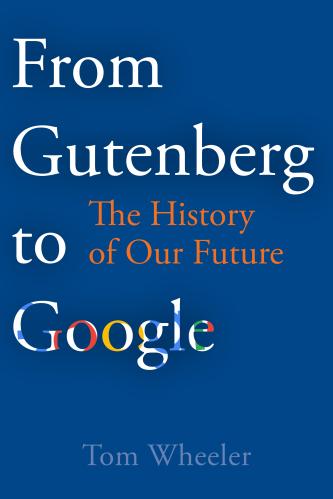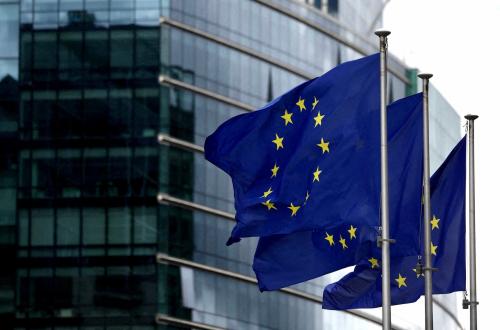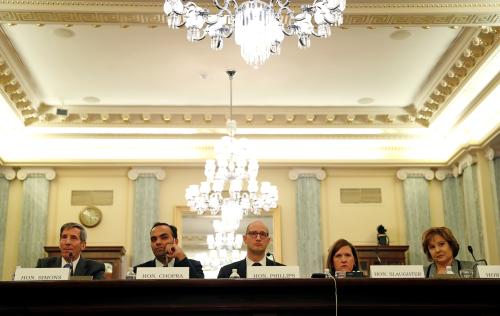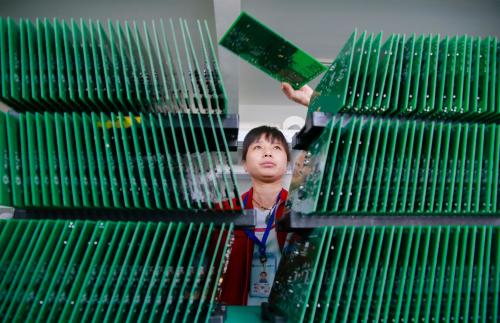Tom Wheeler served as the 31st Chairman of the Federal Communications Commission from 2013-2017.
Senator Elizabeth Warren (D-MA) has proposed using the antitrust laws to break up the large digital platform companies. As it should, the proposal from a former Harvard Law School professor who also happens to be running for president of the United States has received much attention. There can be little doubt that the major digital companies have gained a level of economic control akin to the industrial barons of the Gilded Age. It is important to take steps to introduce much needed competition into the digital marketplace.
The question, however, is whether the approach that worked with industrial barons is also the best for dealing with the internet barons. Clearly, a more active review of mergers is necessary, even when the acquired company is comparatively small. However, the other prong of antitrust policy, the physical breakup of dominant companies, may not be the only path to competition in a world where the tools of dominance are virtual rather than physical.
Breaking up the digital companies into smaller clones may reduce their size, but each new company will still possess the virtual assets that enabled their parents’ anticompetitive activities in the first place: the databases full of information about you and I. Break open that hoard of digital information, make it available to innovators and competitors, and the marketplace can function. Requiring competitive interconnection to databases would have the effect of an “internal break up” by going after the source of its market control.
Telephone networks and the internet
AT&T was broken apart in 1984—10 long years after filing of the antitrust lawsuit against the company. In the years since, it has become clear that one of the most important results of the case was how it forced open the previously closed telephone network. The ability to interconnect non-AT&T phones meant innovation increased while prices decreased. The requirement that competitive long distance companies interconnect to local phone companies had a similar result of lower prices and new services. While the Bell System has been reassembled in subsequent years through new mergers, the open interconnection requirements have proven to be lasting.
The internet itself is all about interconnection—turning disparate networks into an interoperable whole. The data that powers services on that network needs to be similarly interconnected. Like the internet itself, data should be an open, interconnected whole serving innovators and the competitive market.
The concept of net neutrality is all about openness to prevent a physical network bottleneck in the delivery of digital services. The same bottleneck-breaking openness should apply to the locked-away data troves of the companies that ride the internet.
The big digital companies benefit from what economists call “network effects”—the more people that are on their service, the more attractive the service is to others. In digital markets, such network effects drive the agenda. You want to be on a social network with the greatest reach to your friends. Advertisers want to do business with platforms whose broad reach provides them with the most specific targeting data. The two realities then reinforce each other to become a barrier to innovation and competition.
Network and platform companies
The good old days of competition are gone from the digital marketplace. The big tech execs like to say that “competition is a click away,” but that is myth. The young and spunky Facebook was able to beat the more established Myspace in the early days of social media through traditional “my product is better than yours” competition. But this couldn’t happen today, no matter how much better the new product is. Taking on Facebook today would mean taking on the data hoard of two and a quarter-billion users and the precision targeting it offers advertisers. The digital reality is that if you do not have the targeting precision, you don’t have the revenue, no matter how good your new product may be.
Siphoning your personal information and hoarding it is not limited to platform companies like Facebook and Google. The networks that take you to and from the internet—companies such as AT&T and Comcast—watch everything you do on the network. They, too, hoard that information for their own exploitation. When network company AT&T acquired media content company Time Warner, for instance, executives made no bones about how they intended to use the information AT&T’s network collects about you to target Time Warner programming and advertisements.
When the Obama Federal Communications Commission (FCC) imposed consumer privacy protections on the internet networks, the companies complained it was not “fair,” since the platform companies had no such rules. Together the networks and platform companies convinced the Republican-led Congress to repeal the FCC’s privacy rules. Now, however, the opportunity exists to treat both the networks and the platforms alike and require them to open their data hoards.
Lessons from cable TV and British banks
Congress has faced such a situation before. In the late 1980s, both cable television and direct satellite broadcasting were new, growing, and competitive industries. Through ownership and contract, however, cable television operators made it hard for the satellite companies to acquire the programming consumers wanted. In 1992, Congress required open access to the video content essential for satellite to become a viable competitor.
The 1992 solution echoes today. This time, the asset necessary for digital competition is information about consumers, and it needs to be similarly open and available. This does not necessarily mean it is free, but it should no longer be locked away and usable only by a company for the purpose of gaining market dominance. Such an open data policy will also have to contain consumer privacy protections and accompanying oversight. An open data policy now exists for the largest banks in the United Kingdom. Before the Open Banking initiative, consumers could use only the services of the bank that held their information. Under the new rules, however, the consumer’s digital information remains the asset of the financial institution, but with the consumer’s permission, it is accessible by third parties. There are now approximately 200 companies in the process of taking advantage of the open data to develop innovative new apps for consumers.
The U.K.’s Open Banking initiative also provides an example of 21st century regulation in the rapidly changing digital world. Rather than rigid government-imposed rules, the financial institutions were mandated to develop a data sharing protocol, including an enforcement review organization. As technology evolves, the industry protocol can as well, without the limitations of clumsy regulation—yet it still must pass muster with the government-supervised enforcement organization.
Our antitrust laws were written in the late 19th and early 20th centuries. They reflect both the eternal concept of competitive markets as well as the industrial realities of the time. Yes, if companies get too big and abusive, physical breakup is an option. But first, let’s require those companies to have an internal break up, and break open the data that gives them their power.
Facebook, Google, Comcast, and AT&T are donors to the Brookings Institution. The findings, interpretations, and conclusions posted in this piece are solely those of the author and not influenced by any donation.







Commentary
Should big technology companies break up or break open?
April 11, 2019